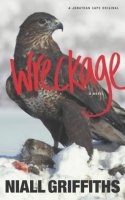Book Review: Niall Griffiths' Wreckage
by anna battista

Unfairly described as “the Welsh Irvine Welsh”, for the main characters in his first novel Grits, which portrayed a group of young people trying to overcome addiction in a small town in Wales, and for his use of vivid language, Niall Griffiths has proved with his later novels Sheepshagger, Kelly + Victor and Stump that this comparison is simply flawed.
Griffiths’ new work, Wreckage, starts exactly where Stump finished. In the latter, two Liverpool scallies in shellsuits, timid Alastair and violent Darren, had travelled all the way to Wales to find, for their revengeful boss Tommy, a one-armed man who had committed some kind of offence against him. In Wreckage the two young men are going back to Liverpool from their mission. On their way home, they rob a post office and Darren plunges a hammer on the sub-postmistress’s head, a thing Alastair immediately regrets, imagining in her place his own grandmother who’s dying in a nursing home.
When the book opens, Darren is in a buzz, thinking about the money they have just stolen, while Alastair can’t get out of his head the noise of the hammer falling on the woman’s head and is feeling guilty. Things get even more out of hand when they arrive in Liverpool, as the money gets stolen by two young scallies and Tommy starts wondering what happened to Darren and Alastair while they were in Wales.
The title of the book seems to refer to what is left of the various characters at the end of the story: just “wreckages”, relicts of human beings to whom no redemption is conceded. The novel goes backwards and forwards in time: towards the end of the book, the author even manages to connect his scallies and disenfranchised youth to the Celtic diaspora, examining how violence destroys humanity and how it metamorphoses as years passes, though, essentially, it is still pure and simple dehumanising violence.
As in his previous novels, Griffiths uses language in an aggressive but effective way, switching from one accent to another. The dialogues or the stream of consciousness passages in Wreckage are written in a wild, lively and sharp language and are alternated with descriptive parts: the author also manages to grace his descriptions of the landscape surrounding his characters with poetical colours and powerful images, while there is also space for a bit of social commentary when Darren’s mother speaks (“But Bush and Blair and that friggin Thatcher, they’ll have to answer to God. All of them. That friggin bin Laden in his cave n all, they’ll all have to stand there in front of Him an justify their lives and their actions and what’re they gonner say then, ey? How’re they gonner defend themselves then? Me too, oh, aye, I’m not gonner escape…an what I gonner say? How can I excuse meself, what reasons can I give for bringin a baby into this world who hates the world?”)
Wreckage has already been dubbed Niall Griffiths' most confident and audacious work so far, you can only hope that it will finally prove to the sceptics out there that Griffiths is not another Irvine Welsh impersonator. He’s just one of the most talented writers around.
Copyright (c) 2005 erasing clouds |
|